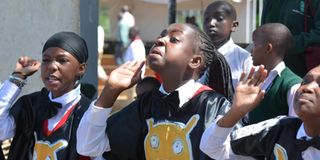Students tackle climate crisis through film at national drama festival

Alliance Girls High School presents the play The Catastrophe during the Kenya National Drama and Film Festival at Menengai High School. The play was scripted by Oliver Minishi and adopted and directed by Asige Silingi Bramwel.
What you need to know:
- The initiative comes at a critical time for Kenya, which ranks among the countries most vulnerable to climate change despite contributing minimally to global emissions.
The year is 2060, and you are on a fireside chat with your grandchildren. You grew up in the Northeastern part of Kenya - Garissa County. Your grandchildren are inquisitive, and they wonder what life was like four decades before they were born, so you tell them the story of the worst drought ever in your region. They have heard about climate change and seen its effects in their time, but they want to understand how it was experienced in the past.
You confidently share your memories because during the 63rd edition of the Kenya National Drama and Film Festival, you were among the students recognised for exemplary climate storytelling. At the time, you were considered among the best young climate communicators in the country. You tell the story with ease, emphasising the moment you received an award and proudly show them a yellowed newspaper clipping from 2025.

Artar Girls High School presents a cultural dance during the State Concert for the winners of the 63rd Kenya National Drama And Film Festival at State House, Nakuru on April 16, 2025.
This imagined future conversation reflects the potential long-term impact of a new award launched during this year's festival. The Climate Storytelling Award, curated by Tunga Afrika in partnership with the Kenya National Drama and Film Festival (KNDFF) and Climate Story Lab Africa, invited students to creatively engage with one of today's most urgent global issues—climate change.
The initiative comes at a critical time for Kenya, which ranks among the countries most vulnerable to climate change despite contributing minimally to global emissions.

Westlands School presents the winning choral verse at the 63rd National Drama and Film Festival at Nakuru Lions on April 15, 2025.
According to the Kenya Meteorological Department, the country has experienced increasingly erratic weather patterns over the past decade, with the frequency and intensity of droughts and floods rising dramatically.
Northeastern Kenya, including Garissa County, has been particularly hit hard. The region experienced five consecutive failed rainy seasons between 2020 and 2023, creating one of the worst droughts in recent history. More than 4.4 million Kenyans faced acute food insecurity during this period, with school attendance dropping significantly as families were forced to migrate in search of water and pasture.
Against this backdrop, engaging young people in climate communication has become increasingly vital. The National Climate Change Action Plan (2018-2022) specifically identified youth involvement as essential to Kenya's adaptation and mitigation efforts, yet platforms for young voices have remained limited until initiatives like this award were rolled out.
Bringing climate stories to life
For the first time in the festival's 63-year history, students from across Kenya presented climate-focused performances and films, using creative storytelling to highlight environmental challenges facing their communities and propose solutions.
One of the winning entries, a 15-minute short film produced by Garissa High School students, highlights the plight of Kenya's Northeastern region when climate impacts hit home. The film, titled "Mazingira Yetu, Mustakabali Wetu" (Our Environment, Our Future), focuses on the restoration not only of the environment but hope for a better planet.
The documentary shows the impacts of prolonged droughts and recurring floods on the local community in Garissa, with particular attention on how these challenges affect education and livelihoods. Through compelling testimonials, the students demonstrated how they are taking action by leading tree-planting initiatives as a sustainable solution to restore their environment.
Wenje Secondary School, the second-place winner, presented a performance exploring the increasing vulnerability of coastal communities to rising sea levels and extreme weather events. Their production emphasised traditional ecological knowledge and adaptive practices being implemented in their region.
Ruaraka High School, which secured third place, focused their project on urban climate challenges, highlighting issues of waste management, air pollution, and green spaces in city environments. Their creative work illustrated how urban youth can contribute to climate solutions even in concrete-dominated settings.
"The Climate Storytelling Award is a vital new category that aims to raise awareness around climate change," said Prof Christopher Odhiambo, national chairman of the Kenya National Drama and Film Festival. "We sincerely appreciate Tunga Afrika and partners for their dedication to youth empowerment and climate adaptation. These partnerships affirm that young people are change makers today."

Students from Kisumu Girls perform their cultural dance titled 'The Cage' during the closing ceremony of the National Drama and Film Festival at Melvin Jones on April 15, 2025.
Alongside the Climate Storytelling Award, the festival introduced The Film Hub, another initiative developed in collaboration with Tunga Media Afrika, Docubox East Africa, Film Fund, Kenya Film Commission, and Kenya Grips and Sparks Lighting. This complementary programme enhanced students' creative experiences during the festival, which ran from April 2-12 at Moi Girls High School in Eldoret.
The Film Hub provided participants with immersive learning opportunities including screenings and discussions of climate-themed films, hands-on experimentation with professional film equipment, virtual reality exploration, interactive climate games, storytelling masterclasses, and collaborative film projects. Over 500 students from across Kenya's 47 counties participated in these sessions, representing the largest youth climate engagement event in the festival's history.
"At Tunga Afrika, we believe in the power of storytelling to drive social change," said Cindy Makandi, founder and director of Tunga Media Afrika. "This award inspires students to explore climate challenges in their communities and propose practical, localised solutions. We're proud to work alongside KNDFF to honour and elevate these powerful youth-led stories."
The three winning schools received significant recognition for their work. Garissa High School, Wenje Secondary School, and Ruaraka High School were awarded Sh200,000, Sh150,000, and Sh100,000 respectively. Beyond the monetary prizes, each school also received an Impact Grant to support screenings and climate engagement activities in their communities—ensuring their stories drive real conversations and solutions.
Youth climate activism has been gaining momentum globally since 2018 when Swedish activist Greta Thunberg began her school strike. In Kenya, however, opportunities for structured youth climate engagement have been limited, particularly in rural areas most affected by climate impacts. This award creates a sustainable platform for amplifying youth voices from these vulnerable regions.


